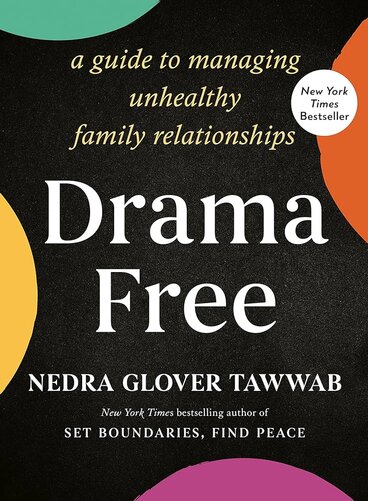“The relationships that impact us the most are those with family. The wounds are deep, and the relationships are filled with expectations.
In Drama Free: A Guide to Managing Unhealthy Family Relationships, licensed therapist and author of Set Boundaries, Find Peace: A Guide to Reclaiming Yourself, Nedra Glover Tawwab, provides a guide for dealing with unhealthy family dynamics and relationships. Her first book, Set Boundaries, is one of my favourite books on boundary setting.
Drama Free Book’s Theme:
- The book is a tool to help readers develop the skills needed to reclaim their voice in a dysfunctional family.
The Challenge
- Often, we avoid being honest about our family experiences because we fear challenging conversations or possibly feeling the need to leave our family behind. Releasing family relationships is only one option of many, and having tough but intentional conversations can create positive change.
Question the book tries to help readers answer:
- How can I successfully have relationships with family members when there’s an underlying issue?
- How can I disconnect from family members when I no longer wish to maintain the relationship?
Drama Free Book’s Proposition
Teach readers how to manage dysfunctional family relationships better, sever ties when those relationships become unmanageable, and set clear health boundaries for yourself and your family members.
“Family relationships are the most common type of unhealthy relationship.”
About Nedra Glover Tawwab
Nedra Glover Tawwab, MSW, LCSW, is a licensed therapist and author of Set Boundaries, Find Peace: A Guide to Reclaiming Yourself. She has over 15 years of experience as a relationship therapy specialist. She is the founder of group therapy practice Kaleidoscope Counseling. Some of Nedra’s relationship specialties include helping clients and readers create healthy relationships by setting healthy boundaries. Navigating family dysfunction (drama) and dealing with emotional immaturity.
Favourite takeaways from reading Drama Free: A Guide to Managing Unhealthy Family Relationships
Who first made you feel that way?
One question that often comes up in therapy is “Who was the first person to make you feel that way?” The answer typically goes back to the first experience occurring in the family. How people engage in the family is usually how they engage in the world.
Typically, the narrative floats back to childhood. We carry the weight of the years when we were most powerless, as if we have to continue that way, but adulthood gives us the opportunity to change our narrative.
Family of Origin: Tension and Resentment
They are where we spend our formative years and a considerable amount of time (if not physically, then mentally). The people in our childhood home are our primary teachers for many years. But what happens when we want to show up in the world with views, traditions, or a lifestyle that diverges from those of our family? It can create tension and resentment. The truth is that during your childhood, you likely weren’t allowed to be yourself, so as an adult, you’re becoming more your true self. And it’s healthy for you to figure out who you are, separate from who you were molded or told to be.
“Behaviors stick to you until you consciously change them.”
Family Dysfunction
A dysfunctional family is one where abuse, chaos, and neglect are accepted norms. In dysfunctional families, unhealthy behaviors are overlooked, swept under the rug, or catered to. It’s hard to ascertain dysfunction until you’re exposed to other, healthier situations. And even when exposed to better relationships, it can still be hard to break away from dysfunctional patterns.
It’s hard to ascertain dysfunction until you’re exposed to other, healthier situations.
You have Agency
Culture impacts our views of family, and in some cultures, speaking up against unhealthy family practices or wanting something different could seem to be going against your cultural values. Adults can create their own identities, even in family relationships. You are allowed to change aspects of the existing culture in your family—such as visiting without advance notice, taking care of elderly parents while raising your own children, or giving unqualified family members roles in your business. You have the power to create your own story while allowing your family to maintain their culture. You aren’t being offensive; you are simply trying to create a life that fits your desires.
When it’s family, we might make an unhealthy exception because—it’s family. But we shouldn’t make that mistake. Don’t allow anyone to mistreat you, no matter who they are.
Family relationships are the only type of relationship where people are expected to ignore and easily forgive abuse, neglect, and abandonment. When people remain in relationships where abuse or neglect has occurred, they often experience resentment, anger, grief, fear, and sadness. Just because the abuse or neglect is no longer present doesn’t mean that the person has overcome the effects. Also, challenges remain even in adult relationships.
Maintaining relationships with the perpetrators of trauma can exacerbate symptoms of depression, anxiety, post-traumatic stress disorder, bipolar disorder, and other mental health issues. Many adults struggle in their relationships with family members who harmed them as children. There’s no such thing as forgetting. We can ignore, deny, or push it down, but many never forget trauma from childhood. Even when someone has no physical memory of it, their body and neurological system respond to the trauma.
Codependency
In healthy adult relationships, you don’t have to be responsible for other people. The responsibility of managing someone else’s life, mood, boundaries, and feelings is codependency. In unhealthy adult relationships, codependency can manifest as feeling entitled to access someone’s life and how they choose to function in their life.
Enmeshment
Enmeshment is when there’s no separation between yourself and others. Sharing the same perspective on all things, existing in the same way, and having very few boundaries are basic components of enmeshment. In dysfunctional families, enmeshment allows everyone to stay the same, and when the status quo is challenged, the challenger becomes a scapegoat, rule breaker, and threat. A family is a cultural system. Sometimes, when individuals try to create new traditions, shift roles, or create boundaries, the system feels under attack.
Change is difficult – Change yourself
We don’t universally agree about problems. You can’t persuade or convince people to change even if you can see how changing could improve their life. You can see how not changing impacts their life and how their behaviors affect you. But the only thing you can change is you. So in some families, it might feel better to live with the dysfunction than to do anything about it.
All the best in your quest to get better. Don’t Settle: Live with Passion.



Comments are closed.